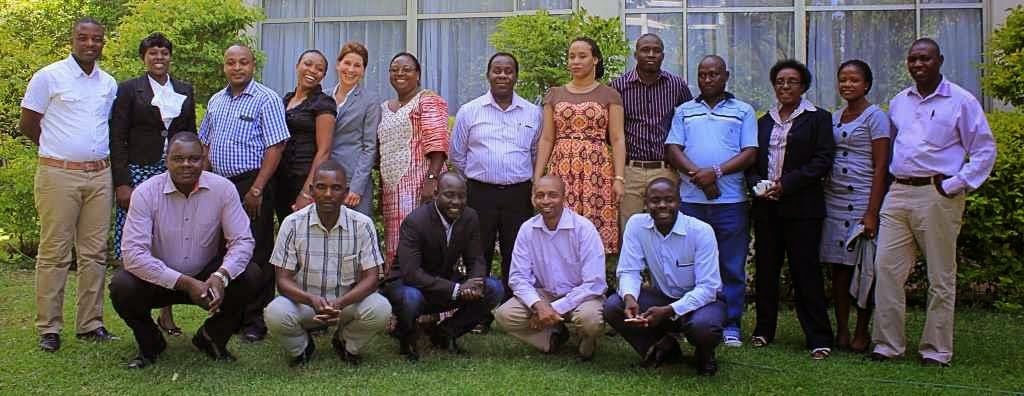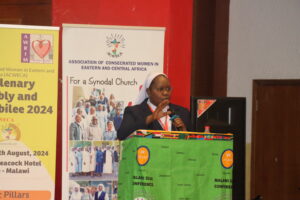KENYA: African Countries Warned to Remain on High Alert against Ebola

Countries,
especially those bordering West African countries have been urged to intensify
Ebola preparedness and put into place measures to curb the epidemic which
remains a major threat in the world.
especially those bordering West African countries have been urged to intensify
Ebola preparedness and put into place measures to curb the epidemic which
remains a major threat in the world.
 |
| Group photo of the workshop participants |
Speaking
during the building capacity in communication and community work on Ebola
Intensified preparedness Programme (IPP) Workshop training held in Kenya recently,
Connecting Organizations for Regional Disease Surveillance (CORDS), to better
manage the Ebola outbreak, the Director for Strategy and operations Dr. Petra
Dickmann said the world is not yet free from Ebola hence the need for every
country, mostly African Countries to develop tools to tackle the disease.
during the building capacity in communication and community work on Ebola
Intensified preparedness Programme (IPP) Workshop training held in Kenya recently,
Connecting Organizations for Regional Disease Surveillance (CORDS), to better
manage the Ebola outbreak, the Director for Strategy and operations Dr. Petra
Dickmann said the world is not yet free from Ebola hence the need for every
country, mostly African Countries to develop tools to tackle the disease.
Dr. Dickmann
said though the cases in West Africa are slowing down, the world is not off the
hook yet, since one case can cause an epidemic. She also revealed that, there
are about twenty other viral haemorrhagic fevers which spread like Ebola and
are likely to be contracted by human beings hence, the call to remain on high
alert.
said though the cases in West Africa are slowing down, the world is not off the
hook yet, since one case can cause an epidemic. She also revealed that, there
are about twenty other viral haemorrhagic fevers which spread like Ebola and
are likely to be contracted by human beings hence, the call to remain on high
alert.
Dr. Dickmann
said the reason for IPP Program in Congo, Uganda, Tanzania, Kenya and other
networking countries affected and not yet affected, is because CORDS realized a
huge gap during the Ebola outbreak in West Africa and needed to come up with
local solutions in curbing the menace.
said the reason for IPP Program in Congo, Uganda, Tanzania, Kenya and other
networking countries affected and not yet affected, is because CORDS realized a
huge gap during the Ebola outbreak in West Africa and needed to come up with
local solutions in curbing the menace.
She said
that the ongoing trainer of trainees (ToT) program is to enable countries share
their experiences and to promote working with communities to amplify the
methods used from previous Ebola outbreaks to inform current risk management in
a more acceptable ways initiated at the community level.
that the ongoing trainer of trainees (ToT) program is to enable countries share
their experiences and to promote working with communities to amplify the
methods used from previous Ebola outbreaks to inform current risk management in
a more acceptable ways initiated at the community level.
The training
brought together twenty participants from Kenya, Uganda, Tanzania, Malawi,
Burundi, south Sudan, Zambia and Ghana.
brought together twenty participants from Kenya, Uganda, Tanzania, Malawi,
Burundi, south Sudan, Zambia and Ghana.
CORDS is a
unique, international non-governmental organization, building information
exchange among disease surveillance networks in different areas of the world,
it is a network of networks, that promote global exchanges of best practices,
surveillance tools and strategies, training courses, innovations, successful
operating procedures, case studies and other technical data.
unique, international non-governmental organization, building information
exchange among disease surveillance networks in different areas of the world,
it is a network of networks, that promote global exchanges of best practices,
surveillance tools and strategies, training courses, innovations, successful
operating procedures, case studies and other technical data.
By Rose Achiego, Waumini
Communications KCCB
Communications KCCB


